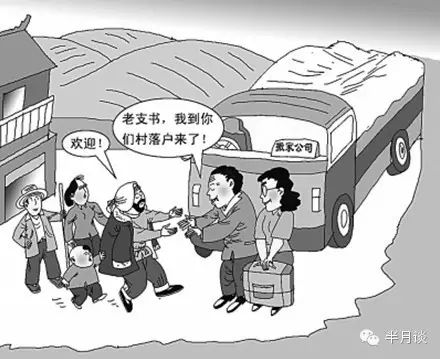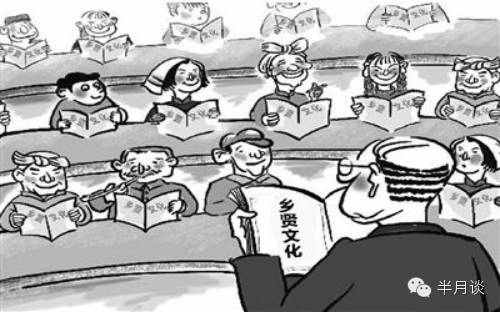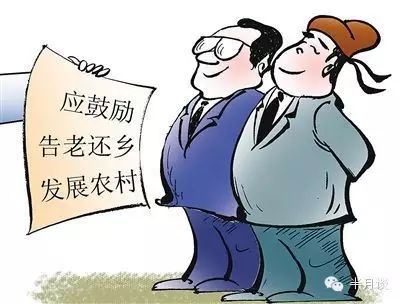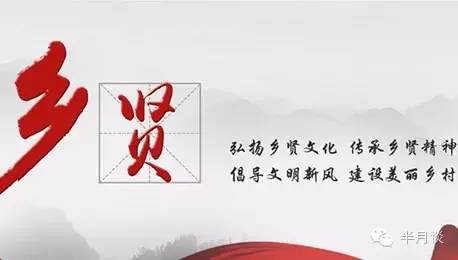Field Angelica: Smooth Return of Officials to Their Hometowns
—— Retired Officials Transforming into New Local Worthies (Observation Part Two)
★
Half-Month Talk reporters found during grassroots research that currently, retired officials returning to rural areas to become new local worthies is still a choice made by a minority. The existence of a dual urban-rural structure, the dramatic changes in social environment and cultural psychology, restrict the integration of retired officials into rural areas and their benefits to local communities.
★

01
The Pain of Nostalgia, the Distance of Hometown
“Over the past 30 years of reform and opening up, the development between urban and rural areas has been unbalanced. The economic income, educational resource allocation, and high knowledge work nature in cities have caused outstanding talents in rural areas to flow to cities.” Liu Yuqing, Dean of the Institute of Chinese Studies at Shanxi University, analyzed that due to the uneven distribution of resources such as medical care, education, and culture, as well as the good pension security mechanism after retirement, the return of retired officials to their hometowns is hindered.
Currently, the rapid advancement of urbanization has led to a dilemma of elite loss in rural areas.“Those who jumped out of the dragon gate through entrance exams in their early years are quickly swept away by the trends of big cities, thus losing their desire to return home.” According to Gu Jun, a professor in the Department of Sociology at Shanghai University, the wave of urbanization has caused economic, political, and cultural resources to concentrate in cities. Retired officials, accustomed to urban life, lack a sense of gain and comfort when returning to their long-lost hometowns, naturally leading to a sharp decrease in those returning to their hometowns.
Professor Wang Anbai from Southwest University of Political Science and Law summarized the current situations of officials returning to their hometowns into three categories: first, those who have left the countryside and no longer own rural land, renting a house upon returning, which is akin to leisure; second, although the officials themselves no longer have land, other family members still do, and they return to stay with relatives; third, officials who have no connection to the countryside and no relatives in the village, living entirely in rented accommodations.
Writer Chang Zheng believes that the system of officials retiring to their hometowns in ancient times is no longer applicable to today’s social reality, which is due to environmental changes, making returning home not a common choice for retired officials.
“In the past, civil officials retired and military generals laid down their arms, owning land and property in their hometowns made returning a choice in line with their own interests.” Wang Anbai said that nowadays, returning officials find it difficult to establish themselves in rural areas.
Zhang Jianjun, Deputy Director of the Economic and Social Development Research Institute of the Gansu Provincial Party School, stated that many officials come from rural areas, but early household registration management regulations have completely severed the ties between officials and rural areas. What rural areas leave for them is only nostalgia, not a sense of belonging.
Fang Xiaoze, a retired cadre and former deputy researcher in Dachang Town, Wushan County, Chongqing, discussed why he could return home, saying: “First, my daughter is in my hometown, and second, my hometown has my wife’s land. Many people want to return home after retirement, but the conditions in their hometown are too poor, or they have lost their land.”
 Image source: “Guangming Daily”
Image source: “Guangming Daily”
02
Life Inadaptability, Psychological Concerns
Half-Month Talk reporters found that today’s officials returning home is different from the ancient practice of local worthies returning with their families. Nowadays, officials’ families often reside in cities, and upon returning home, they face many practical problems as they age, such as inadequate medical security and lack of care in daily life.
Associate Professor Shao Xiaoying from the School of Marxism at Fudan University told Half-Month Talk reporters that the huge gap between rural and urban areas hinders the return of retired officials. Currently, the retirement benefits, medical security, and other living factors of officials are completely tied to the cities they are in. Returning to rural areas will result in significant changes in living conditions, many of which cannot be resolved by personal efforts.
A retired cadre from Yancheng, Jiangsu, Mr. Xia, said that after decades of working in the city, his medical insurance and social security are in Nanjing. Returning home, the inter-city connection is quite troublesome. “Moreover, the medical resources in rural areas of northern Jiangsu cannot compare with those in Nanjing. For older people, in case of an emergency, it takes more than an hour to drive from the village to the city hospital, and treatment cannot be timely.”
Mr. Hu, a retired elder from a western city, expressed similar concerns: the medical and health conditions in the countryside are too poor, and he cannot withstand the torment of illness due to his old age. An elderly person of the same age in his hometown fell seriously ill and needed to go to the hospital for examination, but could only rely on relatives to push him in a cart to a township hospital several dozen miles away. However, the bumpy road caused him to pass away before reaching the hospital.
“Village clinics can only treat minor ailments, and young doctors in the clinics can only administer IVs and provide simple medications.” Retired cadre Yang Shenghai said that the health conditions at the village level are indeed quite backward, making medical treatment very inconvenient.
Li Cuitian, a representative of the National People’s Congress and Party Branch Secretary of Zigan Village, Zigan Township, Yuanping City, Shanxi Province, stated that some officials are unwilling to return home not only due to objective conditions but also due to other subjective concerns. They have worked in cities for a long time, have less contact with rural areas, and find it difficult to communicate and interact with villagers after returning. Some villagers have overly high expectations of these retired officials, making it hard for them to settle down after returning.
“Rural areas are relatively closed and very realistic; if you return home, you must bring development results to the locals for them to see your value; if you do not bring tangible benefits to the locals, they will feel you lack capability and often will not respect you.” said a retired official.
Retired cadre Ding Hanping said that when he initially decided to return home to work, he faced considerable resistance. On one hand, his family was clearly opposed, believing he was too old and should enjoy retirement without needing to return to the village to “stir things up”; on the other hand, there were many rumors suggesting that he wanted to return to the village to become a group leader and profit after retiring from being a director. Such remarks made him feel particularly disheartened.
During grassroots interviews, some grassroots cadres and the public also reminded that care should be taken to prevent individual returning retired officials from using their influence to interfere with rural governance, or even engage in “option corruption,” which is not only detrimental to the development of their hometown but also creates negative social impacts.
 Image source: Xinhua News Agency
Image source: Xinhua News Agency
03
Innovative Policy Mechanisms to Encourage More Retired Officials to Contribute to Rural Areas
“Currently, there are indeed many retired officials facing difficulties returning to their hometowns. It is suggested that the government introduce relevant policies to address some practical difficulties encountered by retired officials returning home.” Li Ruifeng, a representative of the National People’s Congress and Dean of the School of Chemical Engineering at Taiyuan University of Technology, said.
Hu Rongzhong, Minister of the Organization Department of the Guizhou Duyun Municipal Party Committee, has actively volunteered to serve as the Party Secretary in Dunzao Township, located in the heart of the Masha Mountains. In his view, many cadres are idle and wasting their talents after retirement in cities, and the organization department should innovate the system and mechanism to create a good atmosphere and platform for retired cadres to work and start businesses.
Liu Yaodong, Director of the Public Administration Department at Hubei University of Technology, suggested that the state should shift investment focus to rural areas, combining new urbanization and urban-rural integration processes to eliminate the major gaps in income, infrastructure, public services, and cultural education between urban and rural areas. “In the future, as the rural landscape changes, many children who have left their hometowns will be continuously attracted to return home for development, forming a positive interaction between urban and rural areas. Retired officials should become leaders of this trend.”
 Tao Xiaomo Illustration
Tao Xiaomo Illustration
Many interviewees suggested that county and township institutions should implement an honorary appointment system for retired officials; retired officials who contribute significantly after returning home should be recognized according to relevant regulations; and there should be genuine concern and care for returning retired cadres, creating conditions for their healthy living and solving practical difficulties. For example, idle village committee houses and office equipment in rural areas can be utilized to provide them with living and working spaces.
Currently, the new local worthy group is scattered. If not systematically organized, managed, and serviced, and if the enthusiasm of this group to contribute upon returning home is not protected, it will be difficult for the new local worthy group to develop positively. In Shuanglong Town, Wushan County, Chongqing, located in a concentrated area of national poverty, recent years have seen the establishment of a talent database for capable individuals in the town, with over 80 out of more than 400 entrepreneurial talents returning, bringing back advanced technology and open ideas. Liu Tingyan, Party Secretary of Shuanglong Town, said that a retired official information database could be established based on this model to provide precise services and attract them to return home for work and life.
The transformation of officials returning home into local worthies marks a new starting point for power constraints. Li Weinan, Director of the Rural Social Management Innovation Research Center in Hubei, suggested exploring scientific, reasonable, and rigorous institutional guarantees, strengthening subsequent management and supervision systems, and better leveraging the positive effects of retired officials returning home, truly achieving the goals of being active in old age and enjoying life.
“Being a local worthy means being dedicated and having a vision!”Many retired officials expressed this sentiment during interviews with Half-Month Talk reporters.
Zhao Deying, now 89 years old, returned to his hometown in Tingdian Village, Yangcheng County after retiring from the position of Deputy Director of the Education Bureau in Jin City, Shanxi Province. He personally funded the project to bring sweet spring water from the mountains into the village; he visited households to conduct surveys and compiled village chronicles… Regardless of who takes office in the village, they respect Mr. Zhao. Although there are various inconveniences and difficulties in rural life, Mr. Zhao strives to overcome them and never takes advantage of his age to demand special treatment.
Encouraging more retired officials to voluntarily become new local worthies in rural areas is not a rigid requirement for all retired officials.Retired officials becoming new local worthies should be flexible and diverse, with significant room for innovation in different regions. They can return to their hometowns to become local worthies or go to other places to do so. Officials who were born in cities can also voluntarily become local worthies in rural areas after retirement. Moreover, retired officials can contribute to rural areas year-round or periodically visit, and those who have worked long can return to the city at any time. The choice of form depends on subjective and objective conditions, varying by person, place, and situation. The key is to have a heart that cares for the villagers, a spirit of dedication, and a public responsibility, truly willing and able to do practical work for the “three rural issues.”
In early 2016, the General Office of the Central Committee and the General Office of the State Council issued the “Opinions on Further Strengthening and Improving the Work of Retired Cadres”, emphasizing that all regions and departments should leverage the political, experiential, and prestige advantages of retired cadres, organizing and guiding them to spread positive energy through passing on the Party’s fine traditions, promoting excellent traditional culture, nurturing and passing on good family traditions, caring for and educating young people, conducting legal publicity, resolving conflicts and disputes, and participating in community construction.
It is precisely in leveraging their own advantages and spreading positive energy that a group of retired officials, including former Nanchang Mayor Li Douluo, have already taken the lead, becoming pioneers of new local worthies. They carry nostalgia and a deep love for the land and their fellow villagers, rewriting their life values in rural China and promoting social development. Their actions and spirit are worthy of advocacy.
Local governments should adapt to local conditions, explore paths, refine policies, innovate mechanisms, and show care, allowing more retired officials to return, stay, work well, and live comfortably.(Special participation in research by reporters: Liu Weiwei, Li Jinfeng, Wang Feifei, Liu Xiangxiao, Liang Jun, Xiang Dingjie, Shen Yang, Ma Jian, Ye Hanyong, Han Zhen, Yuan Ruting)(Planning and editing: Wang Yongxia)
 Warm reminder: Click the “Read the original text” below to subscribe to the magazine.
Warm reminder: Click the “Read the original text” below to subscribe to the magazine.

